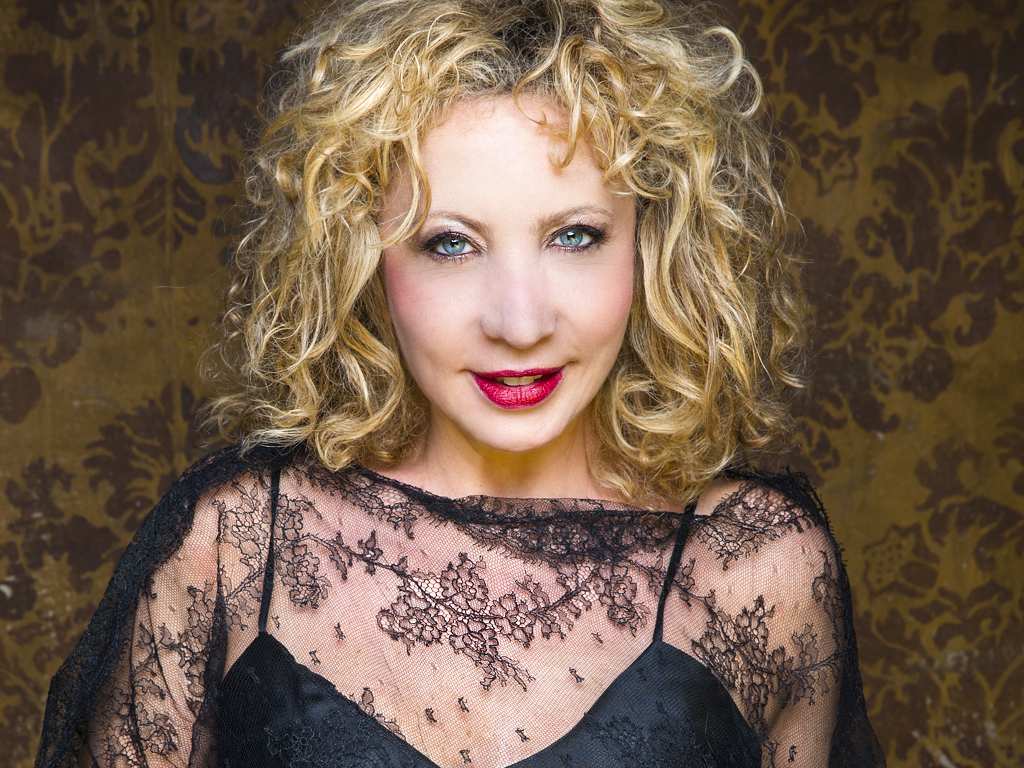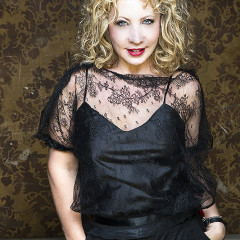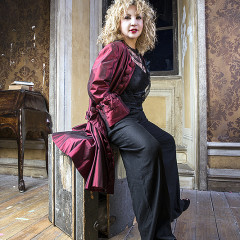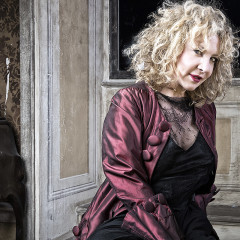
Iaia Forte
Morbida nelle forme e acuta nell’intelligenza. Versatile e camaleontica protagonista al cinema e a teatro. Con Napoli e il suo mare nel cuore
Intervista di Claudia Catalli | foto di Riccardo Ghilardi | location: Centro Sperimentale di Cinematografia
«Il posto più bello del mondo, così magico che sembra ancora abitato dagli dei». Mentre parla di Capri gli occhi le brillano. Occhi dentro cui si agita un mare in tempesta. Sogna di invecchiare proprio di fronte al mare, mi confida l’attrice Iaia Forte. Uno di quei volti che resta impresso. L’abbiamo vista nel film premio Oscar La grande bellezza di Paolo Sorrentino, con tanto di trucco marcato e turbante in testa, e in tutti i film di Pappi Corsicato. In più vanta la fortuna non comune di aver collaborato, sul palco come sullo schermo, con grandi nomi come Toni Servillo, Leo De Bernardinis, Mario Martone, Carlo Cecchi, Federico Tiezzi, Emma Dante, Marco Ferreri, Renato De Maria, Marco Risi.
Quando si prende una pausa dal lavoro la contemplazione della distesa marina le è di ispirazione, e confessa che le manca immensamente ora che vive a Roma. Non a caso, appena può torna a Napoli, la sua città natale, con la quale conserva un rapporto viscerale, evidente anche nei personaggi che porta a teatro (fino a maggio è stata in tour con la Carmen diretta da Mario Martone) e sullo schermo. Interprete versatile, carismatica e camaleontica, Iaia Forte ha scoperto Capri da ragazza e negli anni si è lasciata conquistare dal suo fascino. «L’ho amata al primo colpo e oggi mi piace riscoprirla, soprattutto fuori stagione. Ricordo come fosse ieri la prima volta che ho visto la Grotta Azzurra, un remo sfiorava l’acqua e sembrava produrre zaffiri. Che emozione!». Metto subito alla prova la sua esperienza di amante dell’isola chiedendole il posto preferito, quello dove finisce per rifugiarsi con il pensiero quando i problemi del quotidiano si accumulano. Ha la risposta pronta: «Viale Axel Munthe, dove inizia la Scala fenicia. Da lì si vede Capri con una prospettiva privilegiata: non c’è luogo più immaginifico, conserva qualcosa di speciale e di misterico, sembra che l’isola emerga dal mare per intonare un inno agli dei».
Ha un rapporto particolare con il mare, cosa la attrae tanto?
«Mi seduce la sua mutevolezza costante, l’idea di uno sguardo infinito, la possibilità di non avere fine. Ventotto anni vissuti a Roma non hanno scalfito la mia nostalgia del mare».
Che rapporto ha, oggi, con la popolarità?
«Non essendo un personaggio da copertina, mi piace distinguere la popolarità dal successo, che è quello che gli altri ti riconoscono per il tuo lavoro. Gli applausi sono carezze che confermano che si è lavorato bene ma a fine serata, se non vado a mangiare con il cast, amo tornare a casa, fare una doccia e stare un po’ per conto mio. Esporsi al pubblico può essere “vampirizzante”, dopo c’è bisogno di ritrovarsi».
A Napoli si “ritrova”?
«Napoli sta vivendo un momento di rappresentazione alto. Il successo di Toni Servillo, il Leopardi di Martone, i romanzi di Elena Ferrante, tutti esponenti di una città che, con le sue contraddizioni, mantiene un valore culturale di rilievo. E conserva un’identità precisa, cosa rara data l’omologazione a cui l’Italia tutta ormai è soggetta. Napoli invece fa capo a sé, e questo è nutrimento per chi fa il mio mestiere».
Quando sale su un palco a Napoli percepisce differenze rispetto alle altre città?
«Certamente. Il pubblico napoletano è il più esigente e il più critico con i conterranei. Con me e la mia Carmen si è rivelato molto generoso. In tutta la mia carriera ho sempre cercato di non usare la napoletanità come cliché, in quella forma convenzionale per cui alla fine ci si poggia su meccanismi folcloristici e il risultato è il ritratto della Napoli più banale. Insieme a Martone, Servillo e al gruppo di persone con cui sono cresciuta, abbiamo tentato di riferirci alla nostra tradizione perché ci ha dato tutto, senza mai usarla come alibi, ma piuttosto come spunto per rigenerarla».
Rigenerare, rielaborare, reinterpretare. Sono verbi utili anche a descrivere la sua versione del femminile. Sceglie puntualmente personaggi di donna non convenzionali, una carriera volta a stravolgere lo stereotipo femminile. È così?
«Cerco sempre delle incarnazioni lontane dalla convenzione, lo ammetto. Il mondo femminile ha tanti aspetti che spesso non sono raccontati e descritti in tutta la loro complessità. Adoro l’archetipo femminile di libertà, anarchia e ribellione alle convenzioni. La mia Carmen, ad esempio, si muove nella vita in una forma quasi maschile, sceglie i partner e sceglie di fare della propria vita un terreno di libertà fuori da perbenismi e regole familiari».
Ha un rituale che segue prima di andare in scena?
«Nessun gesto scaramantico, amo fare solo un training di riscaldamento fisico. Anche perché, data l’età e dovendo ballare, mi rilassa. E poi predispone a svuotare la testa, prerogativa essenziale per poter incarnare un altro essere vivente».
Cosa significa fare teatro oggi in Italia?
«Tanta fatica. La situazione non è delle più felici, soprattutto per chi prova a farsi portatore di un senso, rispetto a un lavoro spesso insensato. Viviamo tempi di svilimento. Forse anche grazie a tanti talent show sembra che tutti possano fare gli attori, invece non è così. Mantengo però una visione romantica: credo che il teatro possa ancora non dico veicolare messaggi, perché odio i moralismi, ma chance immaginative da consegnare allo spettatore».
Quando ha capito di poter fare questo mestiere?
«Quando sono stata presa al Centro Sperimentale. È stato un passaggio importante e sono stata fortunata, anzi privilegiata, a lavorare poi in contesti di gruppo. Quattro volte con Servillo, sette con Cecchi, con Ronconi tre. Insomma, ho sempre avuto compagni di lavoro con un certo tipo di evoluzione per cui non esistevano discriminazioni o separazioni di genere».
La maturità le ha regalato maggiore libertà?
«Invecchiare è faticoso, non lo nego, ma ha anche tanti privilegi. Quando si è giovani si è più legati alla vanità, poi arriva un’età in cui si ha meno bisogno dello sguardo altrui per confermare la propria identità. Il tempo passa, non ci si può far nulla. Bisogna soltanto conciliarsi con la propria età e viverla al meglio. Adesso che ho 50 anni me la godo anche di più. Anche se gli innamoramenti sono sempre più rari. Sarebbe bello riprovarli con quella stessa innocenza che avevo quando ero più giovane. Ma poi subentra, se non il cinismo, la paura: si è meno innocenti, invece varrebbe la pena di innamorarsi così, gettando la propria anima in quella dell’altro».
Ha mai il timore che andando avanti possano arrivarle meno copioni e ruoli di spessore?
«No, non ho di queste paure. Sarà che ho sempre amato trasformarmi. Ho anche interpretato uomini, come ad esempio Tony Pagoda, il protagonista del romanzo Hanno tutti ragione di Paolo Sorrentino, che sto per riportare in scena. Pagoda è un grande divertimento: la lingua in cui scrive Sorrentino è teatrale, perfetta da recitare. E dopo il successo che ha avuto in scena il suo primo capitolo, sto preparando il secondo. Mi diverto anche a prenderlo in giro nel suo ipermaschilismo».
Firmerà di nuovo la regia teatrale?
«Sì. Ci è voluto molto prima di firmare una regia. Poi ho imparato che per noi donne è fondamentale non autoboicottarci. Prima non avevo fiducia in me, poi ho capito che non bisogna dar peso allo sguardo altrui e impegnarsi invece a mettere in campo tutta la creatività dentro di noi, senza temere giudizi. È questo il segreto».
Ha anche progetti televisivi all’orizzonte?
«Mi vedrete in Squadra antimafia, con la regia di Renato De Maria, nei panni di una mafiosa siciliana. Sarò la madre dell’attrice Silvia d’Amico».
Iaia Forte
Soft curves, and a fierce intelligence. A versatile, chameleon-like star of cinema and stage. With Naples and its sea in her heart
interview by Claudia Catalli | photos by Riccardo Ghilardi
«It’s the most beautiful place in the world: so magical that it still seems to be inhabited by the gods.» Her eyes shine as she talks about Capri. Eyes with the restlessness of a stormy sea. Later, actress Iaia Forte tells me that she dreams of growing old beside the sea. She has one of those faces that remains imprinted on your memory. We’ve seen her in the Oscar-winning film The Great Beauty by Paolo Sorrentino, with lots of bold make up and a turban on her head, as well as in all of Pappi Corsicato’s films. She has also been fortunate enough to work on stage and on screen with big names such as Toni Servillo, Leo De Bernardinis, Mario Martone, Carlo Cecchi, Federico Tiezzi, Emma Dante, Marco Ferreri, Renato De Maria and Marco Risi – not something that comes to everyone.
When she takes a break from work, she finds inspiration contemplating the vast expanse of sea, and confides that she misses it terribly now that she lives in Rome. Not surprisingly, whenever she has the chance, she goes back to Naples, the city of her birth; the deep intensity of her relationship with her native city is also evident in the characters she plays on stage (she is on tour until May in Carmen, directed by Mario Martone) and on screen. A versatile, charismatic, chameleon-like actress, Iaia Forte discovered Capri as a girl and has been won over by its charms over the years. “I fell in love with the island at first sight and nowadays I like rediscovering it, especially out of season. I remember as if it were yesterday, the first time I visited the Blue Grotto: an oar dipped below the surface of the water and it seemed to produce sapphires. It was such a thrilling experience!” I immediately put her experience as a lover of the island to the test by asking her to name her favourite place, where she likes to retreat to with her thoughts when everyday problems are mounting up. The answer comes straightaway: “Viale Axel Munthe, where the Scala Fenicia begins. You see Capri from a special perspective there: no other place can stir the imagination so strongly: it holds something special and mysterious within it, and it’s as though the island emerges from the sea to sing a hymn to the gods.”
You have a special relationship with the sea: what is it that attracts you so strongly?
“I’m seduced by its constant changeability, the idea of a view that stretches forever, the possibility of having no end. I’ve lived in Rome for twenty-eight years, but that hasn’t changed my nostalgia for the sea.”
How do you feel about popularity these days?
“I’m not a cover celebrity, so I like to distinguish popularity from success, which comes when others recognize your work. Applause is the pat on the back that confirms you’ve done a good job, but at the end of the evening, if I don’t go out to eat with the cast, I like to go home, have a shower and be by myself for a while. Being on display to the public can be “vampirizing”: afterwards you need to find yourself again.”
Do you “find yourself” in Naples?
“Naples is going through a golden period for performance. The success of Toni Servillo, the Leopardi by Martone, the novels of Elena Ferrante, all of them are exponents of a city that, with all its contradictions, maintains a high cultural profile. And it keeps its specific identity, which is rare given that the whole of Italy is becoming homogenized nowadays. Naples, instead, is its own master, and this provides nourishment for someone in my trade.”
When you go on stage in Naples, does it feel different to you compared to other cities?
“Definitely. The Neapolitan public is most demanding and most critical with its fellow citizens. It has shown itself to be very generous with me and my Carmen. Throughout my career, I’ve always tried not to use my Neapolitan origins as a cliché, in that conventional way where you end up relying on the typical picturesque folklore devices that result in a really banal depiction of Naples. Together with Martone, Servillo and the group of people I grew up with, we have tried to draw on our tradition, because it has given us everything, using it not as an alibi, but rather as a starting point for regenerating it.”
Regenerating, reworking, reinterpreting. These are all verbs that could also be used to describe your version of femininity. You invariably choose unconventional female characters,in a career that seems bent on subverting female stereotypes. Is that accurate?
“I always look for incarnations that are a long way from the conventional, I must admit. The female world has many aspects that are often not portrayed or described in all their complexity. I love the female archetype of freedom, anarchy and rebellion against convention. My Carmen, for example, moves through life in an almost masculine way: she chooses her partners and chooses to make her own life a free area that stands outside respectability and the familiar rules.”
Do you have any ritual that you follow before going on stage?
“I don’t go in for rituals to ward off bad luck; I just like to do some physical warming up. Partly because, given my age and the fact that I have to dance, it relaxes me. And it also helps you to empty your head, which is essential if you are to make yourself become someone else.”
What does working in the theatre mean in Italy today?
“A lot of hard work. It’s not the best of situations, especially if you’re someone who tries to make themselves bring meaning to a job that is often meaningless. We live in degrading times. It seems that anyone can be an actor, perhaps partly because of all those talent shows, but that’s not the case in reality. But I keep a romantic vision: I think that the theatre can still, perhaps not convey messages, because I hate to seem moralizing, but offer the audience chances to use their imaginations.”
When did you realise that you could do this for a living?
“When I was taken on by the Experimental Centre. It was an important transition and I was lucky, or I should say privileged, to go on to work in group contexts. Four times with Servillo, seven with Cecchi, three with Ronconi. So I’ve always had fairly progressive work colleagues, and there wasn’t any discrimination or separation of gender.”
Has maturity brought greater freedom for you?
“Growing old is tiring, I can’t deny, but it also has many privileges. When you’re young, you’re more hemmed in by vanity; then you reach an age when you feel less need of other people’s attention to confirm your identity. Time passes, and we can’t do anything about it. You just need to reconcile yourself to your own age and enjoy it as much as you can. Now that I’m 50, I enjoy life even more. Even though falling in love becomes increasingly rare. It would be nice to experience it again with the same innocence that I had when I was younger. But then you find yourself feeling… perhaps not cynicism, but fear: you’re less innocent, but actually it would be better to fall in love like that, throwing your soul into the other person’s.”
Have you ever been afraid that as you get older, you might get sent fewer scripts and there might be fewer roles of any substance?
“No, I’m not afraid of that. Maybe because I’ve always liked to transform myself. I’ve also played men, for example, Tony Pagoda, the main character in the novel Hanno tutti ragione by Paolo Sorrentino, that I’m about to bring back to the stage. Pagoda is great fun: Sorrentino’s language is theatrical, so it’s perfect for acting. And after the success we had with the first part on stage, I’m preparing the second. I like taking the mickey with him: his hyper-male chauvinism.”
Will you be directing the production again?
“Yes. Directing a play should have happened much earlier. Then I realized that for us women it’s essential not to self-boycott. At first I didn’t have confidence in myself, then I realised that we shouldn’t worry about what other people think but we should work to get all the creativity that we have inside us out into the open without worrying about being judged. That’s the secret.”
Do you also have television projects on the horizon?
“You’ll see me in Squadra antimafia, directed by Renato De Maria, as a member of the Sicilian mafia. I play the mother of the actress Silvia d’Amico.”








